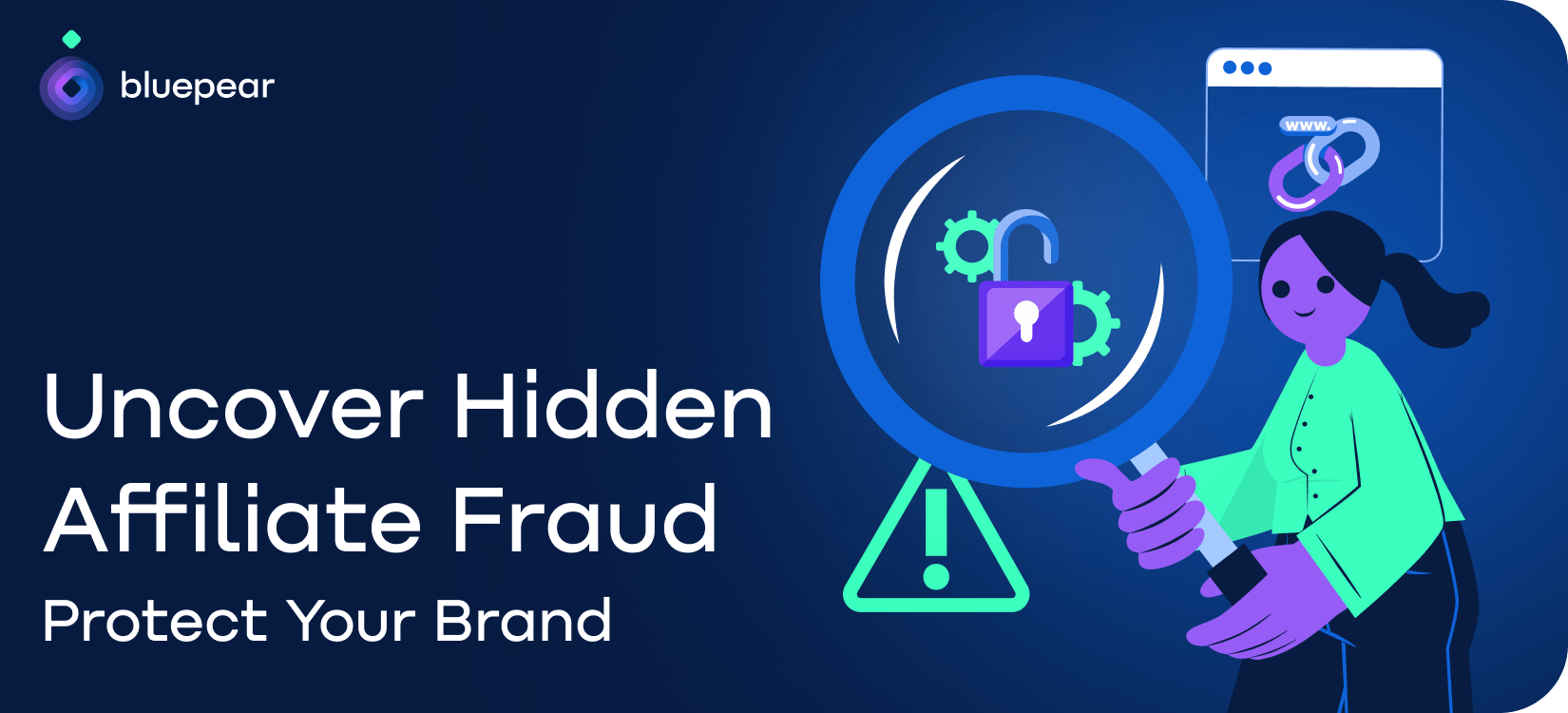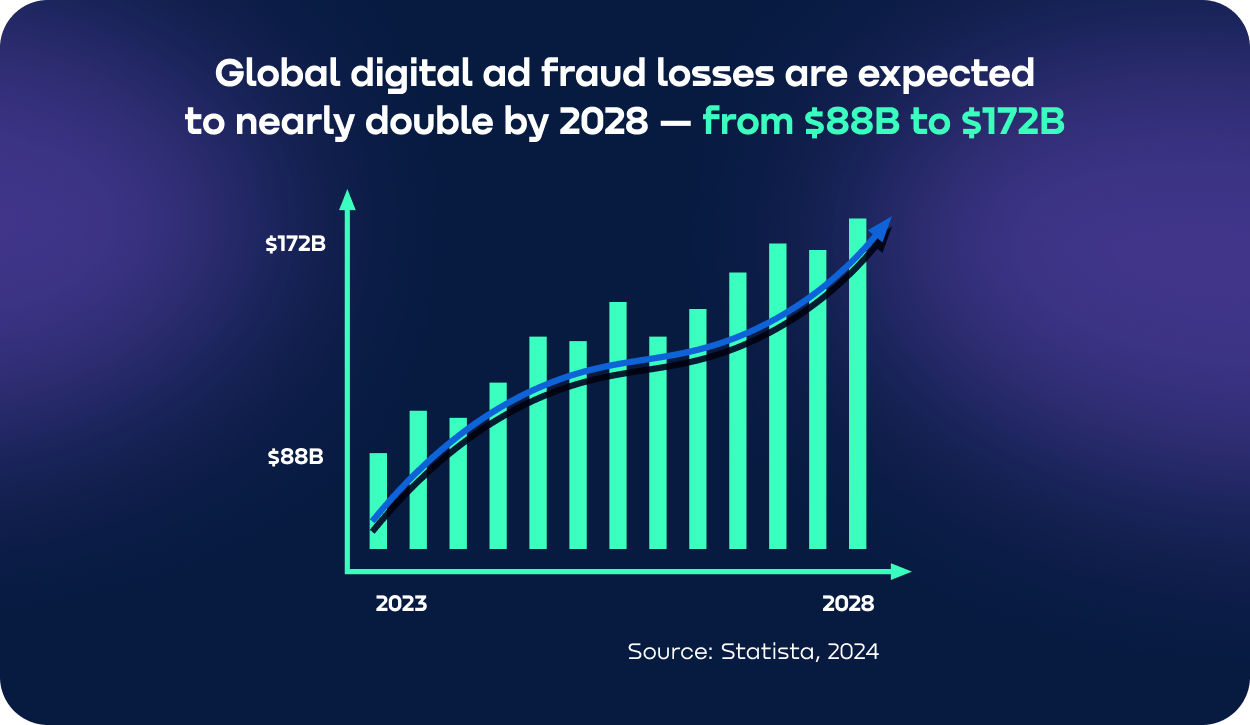
Contents
Affiliate marketing continues to show impressive growth. In 2024, its global market was valued at over $18 billion, and it is expected to reach more than $31 billion by 2031. No wonder, as using the result-driven model is a win-win strategy for both marketers and webmasters.
However, along with the expansion of opportunities for brands and webmasters, affiliate fraudsters are also becoming more active. According to Juniper Research, fraud accounted for 22% of all digital advertising spending in 2023, amounting to $84 billion.
Is affiliate marketing legit? Fortunately, yes. Are there scammers in affiliate marketing? Unfortunately, yes. In such a situation, only a proactive approach will help maintain brand trust and ensure sustainable growth. Let’s learn more about affiliate marketing scams and how to combat them using affiliate fraud detection software.
How Common Are Affiliate Marketing Scams?
Affiliate marketing remains one of the most popular and profitable channels for promotion. Companies pay rewards only for results — sales, leads, or registrations. However, because of its focus on results rather than process, the industry has become an ideal environment for various fraud techniques.
Automation and scaling. Modern tools allow affiliate fraudsters to quickly launch campaigns, spoof cookies, generate fake traffic, and imitate conversions. At the same time, it can be difficult to identify the violator, especially if they use bots or proxy networks. That’s why companies should implement affiliate fraud detection to keep up with the affiliate fraudsters.
Challenges with tracking and evidence. Unlike direct advertising, affiliate marketing is built on trust. Companies often lack detailed analytics for each click, making it difficult to verify sources and assess traffic quality.
Blurred responsibility. Several parties are involved in the CPA/RevShare scheme: the affiliate, the advertiser, the platform, and sometimes the aggregator. In the event of fraud, responsibility is shared, and the actual damage is often written off as “part of operational risks.”
Fraud in affiliate marketing is a systemic problem that requires constant monitoring, technical solutions, and affiliate marketing fraud detection.

Top 5 Scams Affiliates Should Watch Out For
It’s not only brands that are in danger of affiliate marketing scam. Sometimes affiliates themselves may get scammed because of unscrupulous marketers.
Fake products and offers. Affiliates promote a “product” or “offer” that does not actually exist or will not be delivered to the customer. For example, this could be a fake course or fraudulent e-commerce.
Consequences: Affiliates lose their reputation, the audience complains, and their accounts may be blocked on social media or advertising platforms. On top of that, they won't receive any commission payments.
Unpaid commissions. Affiliates attract customers, make sales, but the advertiser refuses to pay because of “low quality” traffic or without any explanation at all. The marketer gets results without paying for them.
Consequences: Affiliates face direct financial losses. This is especially dangerous with large volumes or long-term deferred payments.
Cloned affiliate programs. A copy of a well-known affiliate program is created with a fake website and logo. Affiliates register, drive traffic—but the traffic goes nowhere.
Consequences: Affiliates lose time, traffic, and potential income. Even worse, affiliate fraudsters get their logins and sensitive data, including personal and banking information.
Lead theft and tracking manipulation. Unscrupulous affiliate networks or managers may steal leads, manipulate tracking, or disconnect affiliates after receiving the first results.
Consequences: The leads go to competitors or into a “dark” network, and affiliates lose revenue and control over their audience.
Pyramid scams disguised as affiliate programs. There are affiliate marketing scams disguised as affiliate marketing, where profits come only from recruiting other “partners” rather than from selling products.
Consequences: Affiliates face legal risks, loss of reputation, account blocking, and financial losses.
Those were five most common affiliate marketing scams that may harm webmasters. If you are an affiliate marketer, work only with trusted brands and CPA networks.
5 Affiliate Marketing Scams That Harm Brands
Let’s see what fraud tactics you should be aware of as a merchant:
Google ad hijacking. Some affiliates run paid ads using your brand name, pretending to be the official source. You pay commissions for users who would’ve found you anyway — and your own ad costs go up. That's a marketing scam.
Example: A skincare brand searches its name and sees a Google ad linking to its site — but it’s actually placed by an affiliate. The user clicks, buys, and the affiliate takes a commission for your own organic traffic.
Affiliate fraud detection software Bluepear tracks how your keywords are used in search and notifies you about violations.
URL hijacking. Affiliates buy misspelled versions of your domain and redirect users through their affiliate links. This diverts organic or direct traffic and makes it look like affiliate-driven sales.
Example: Instead of visiting brandname.com, a user types brandnname.com and is redirected via an affiliate tracker. The sale is attributed to the affiliate, and the brand pays a commission for a visitor who was already looking for them.
Bluepear checks your branded SERPs 24/7 and sends you alerts with evidence reports if affiliate marketing fraud (including URL hijacking) is detected.
Brand bidding. Affiliates bid on your branded keywords in search engines without approval, often driving up CPCs and cannibalizing your own campaigns.
Example: A company running Google Ads for “Brand X” notices their cost-per-click doubling. Turns out, affiliates are bidding on the same keywords — and the brand ends up both overpaying and crediting the affiliate for the sale.
Affiliate fraud detection software Bluepear is designed to spot unauthorized brand bidding, so that you can notice it and immediately sanction the affiliate fraudsters.
Cloaked websites. Affiliates use cloaking to hide their real landing pages from ad platforms and even brands, often violating policies or misleading users. That’s another affiliate fraud technique.
Example: You search for your brand’s name in Google and see the affiliate’s landing page that complies with your affiliate program rules. But the real customers will be redirected to another website with aggressive design and fake discounts.
Bluepear detects cloaking and redirects by automatically “clicking through” the ad, simulating real user behavior.
Fraudulent coupon sites. Affiliates promote fake or expired promo codes just to claim last-click attribution. The user was already ready to buy — but the affiliate grabs credit.
Example: At checkout, a customer Googles “Brand X discount” and finds a coupon site with a promo code. They enter the code — and the affiliate earns commission on a sale they had nothing to do with.
Bluepear checks coupon websites for trademark abuse and sends an alert if fraudulent coupons are detected.
How to Spot and Prevent Affiliate Marketing Scam
Here’s a quick checklist for brands to stay protected from affiliate marketing scam:
✅ Monitor branded search results regularly.
✅ Check affiliate landing pages for compliance.
✅ Verify where affiliates get their traffic.
✅ Define and enforce clear affiliate rules.
✅ Track suspicious spikes in performance.
✅ Use affiliate marketing fraud detection tools.
✅ Sanction violations and remove dishonest partners.
Take those simple steps for affiliate fraud prevention and protection of brand’s budgets and reputation.
How Bluepear Protects You from Affiliate Marketing Scam
Bluepear is an affiliate fraud detection system. Here’s how working with Bluepear looks in practice:
• You define branded keywords that the system will monitor in search results.
• Bluepear automatically scans your branded SERPs for any violations.
• Searches are performed 24/7 from different devices, browsers, languages, and IP addresses. This bypasses geotargeting, dayparting, and other cloaking attempts.
• The system collects all key data on each detected ad: ad copy, URL, redirect path, time, and location of the impression.
• It also takes a screenshot and compiles all evidence into a detailed violation report.
• You receive an instant alert as soon as suspicious activity is detected.
As a result, no brand abuse goes unnoticed. All you need to do is define your branded keywords and act on the violations Bluepear uncovers.
Conclusion
Affiliate marketing scam evolves — so should your protecting strategies. Effective brand protection can be ensured by implementing regular monitoring and automated affiliate marketing fraud detection.
FAQ
How common is affiliate marketing scam today?
Fraud is widespread because affiliate programs pay only for results, creating room for fake traffic, cookie spoofing, hijacked clicks, and bot-driven conversions. Automation makes it easy for scammers to scale operations while staying hidden.
What affiliate marketing scams target affiliates themselves?
Affiliates risk falling for fake offers, unpaid commissions, cloned programs, tracking manipulation, and pyramid schemes. These scams drain revenue, damage reputation, and may lead to account bans on ad platforms.
Which affiliate marketing scam tactics harm brands most?
Brands face ad hijacking, URL hijacking, brand bidding, cloaked landing pages, and fraudulent coupon schemes. These tactics steal organic traffic, inflate CPCs, and force companies to pay commissions on customers they already owned.
How can brands detect early signs of an affiliate marketing scam?
Unusual traffic spikes, redirects through unknown domains, coupon pages ranking for brand terms, and sudden increases in CPC are red flags. Checking branded SERPs, landing pages, and affiliate traffic sources helps catch issues early.
Why is affiliate fraud difficult to track manually?
Fraudsters use bots, proxies, dayparting, and cloaking to hide violations from advertisers. Manual checks show only a limited view of what real users see across GEOs, devices, and times of day, making automation necessary.
How does Bluepear help uncover affiliate marketing scam behavior?
Bluepear scans branded SERPs 24/7 across devices, browsers, and IPs, identifies ad hijacking, redirects, cloaking, domain spoofing, and coupon abuse, and compiles a full evidence report with screenshots and URLs so brands can react immediately.
How can brands prevent affiliate marketing scam long-term?
Define strict rules, verify traffic sources, check affiliate pages regularly, monitor branded queries, use fraud detection tools, and remove partners who violate guidelines. Consistent oversight reduces budget loss and protects reputation.

